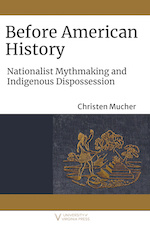Today, we are happy to bring you our conversation with Christen Mucher, author of Before American History: Nationalist Mythmaking and Indigenous Dispossession
What inspired you to write this book?
This book is an entirely different creature from my dissertation, but it has at its heart a similar consideration of the political effects of the past over time. The biggest shift came when I visited Mexico for the first time, in graduate school, and realized how ubiquitous the national narrative of indigeneity is there. I grew up in the US Midwest where there are earthworks all over—to which the general public seems to give little thought—and after graduation I started thinking more systematically about bringing together the main figures of the book (earthworks and the Sun Stone). When I finally visited the National Museum of Anthropology in Mexico City, I knew I was on to something.
What did you learn and what are you hoping readers will learn from your book?
I tend to have lots of different ideas and interests and this book was a decade-long lesson in learning to focus and let other things go. I’m hoping readers in the US will learn to see past the exceptionalism that insists the US project is sui generis; this is particularly a message for early Americanists, I think, because we are often still so silo-ed in our colonial worlds, which itself produces Indigenous invisibility. I also don’t think US Americanists know enough about New Spain or know how to put pre-1848 US-Mexico in dialogue, so ideally this book will help.
What surprised you the most in the process of writing your book?
How often I found myself turning to Indigenous poets for inspiration. Sometimes I had to set the chapter aside and just read some poetry in order to get past a particularly rough section. I wrote a chapter of my dissertation on poetry and never really understood why I did it—but now I think there is something about the distillation of meaning and emotion in poetry that was almost an apprenticeship, it helped me cut through my own. Also, since the book has come out I’ve found myself ruminating on the way the phrase “the beforetimes” seems apt to describe the pasts I write about.
What’s your favorite anecdote from your book?
I think it’s the part at the end of chapter 5, which I tried out on students a few times before writing it into the book: the earthwork in southern Ohio that in the last decade was razed, paved over, and then “reconstructed” in the corner of the new shopping center parking lot. As if the fact of piled earth—any pile—is monument enough. My students are often shocked at the way earthworks have been and continue to be destroyed in the name of “progress.”
What’s next?
I find I’m really into projects with a history of science twist, especially those that help show popular science as settler colonial history. I’m fascinated by herbaria and love a good botanical garden and am working on a project about them. I’m also interested in deep history and can get enough of all the breathless news updates on “new” ancient species (and possibly resurrected ones!). I’ve been lucky to spend a lot of time with my dog and partner during these covid years, and we’ve taken some awesome road trips. Overall I’m trying to prioritize being outside, slowing down and experiencing the world with all my senses more.





